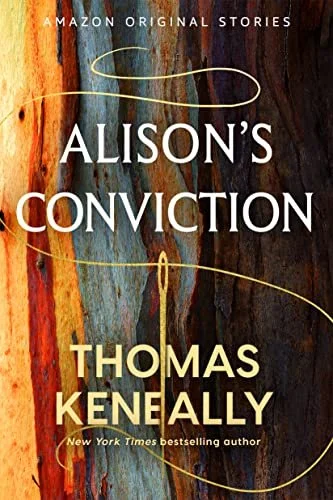Spotlight: Alison's Conviction by Thomas Keneally
/When Alison Strange receives a debt claim she can’t afford to pay from the Australian government’s unemployment office, she’s caught completely off-balance. As she wrestles with a slippery bureaucracy, her history-loving grandfather bolsters her resolve with the story of their ancestor John Strange, an English cobbler who was banished to Australia for his part in a political movement. Drawing inspiration from John’s life, Alison finds her own unique way to demand a future that’s fair for all.
Thomas Keneally’s Alison’s Conviction is part of A Point in Time, a transporting collection of stories about the pivotal moments, past and present, that change lives. Read or listen to each immersive story in a single sitting.
Excerpt
Alison Strange was a clever girl of whom it was known by her mother, her grandfather, and her teachers that she could not face tests of knowledge. Her mother had been told by psychologists that she would never go to university because the business of analyzing what lecturers and tutors meant by their instructions would utterly panic and exhaust her, and basically send her into fits of Tourette’s, into writhings and repeated meaningless sounds like begging. Tourette’s was frequently found in autism cases, a doctor had said. Alison could learn anything if she was interested, but not under any demand that she should know it. She was self-taught, therefore, and her own motivation to know things was the only but powerful machine for her learning. She had, on her own terms, been to the university of Google, just for a start. She had an account that enabled her to read journal articles of all kinds and randomly.
When she was in early high school and the question of convicts arose, she raised her hand and told a teacher, Miss Lambros, that she had a convict ancestor, and she had a date for him too. His ship had arrived in 1821—it was the sort of thing she retained—and his crime was, according to Granrob, stealing shoes. The first Mr. Strange, a convict and shoe thief, settled in Bathurst and opened a shop and a tannery like any settler, and became a constable.
Alison’s chief enemy, Blair Taranto, a beefy child capable of marshaling the laughter of an entire class, had intruded into this conversation, as Alison knew he very likely would.
When Miss Lambros first asked what Alison’s forebear had been transported for, Alison heard Taranto say, breathy with self-amusement, “For being a dead set dropkick.” Taranto is not the main issue of this tale, but when she had given a book report at assembly on Norton Juster’s The Phantom Tollbooth, he had tried to put her off by contorting his face and jerking in imitation of one of her “attacks,” as people called them.
Because of that boy and his easily set-off admirers, she accepted that the world would choose to be as unkind to her as Taranto was. She had in her keeping, though, and held close by her, the essential elements and people. Particularly her mother, Sally Strange, and her grandfather Granrob, as she had eccentrically named him when she was a babe. “Typical of you as a baby, Aly,” he had once said when drinking wine, when he would often tell stories of her infancy, and how different she was from what he called “plain kids.”
“Only you could have come up with that combination of sounds and made a poor sod like me get a special name. I mean, it’s not two easy sounds for a little kid to put together.”
He seemed very proud of her for having managed that, and his warm opinion of her made her think that the Blair Tarantos of her life, as much as they would always be with her, were always somehow wrong, and in a strange sort of way she was willing to endure them.
About the Author
Thomas Keneally is the New York Times bestselling author of more than thirty novels, including The Daughters of Mars, The Chant of Jimmie Blacksmith, and Schindler’s List, which was made into an Academy Award–winning film. Among his many awards are the Booker Prize, Los Angeles Times Book Prize, Mondello International Prize, Trebbia Award, and more. He lives in Australia with his family.















































